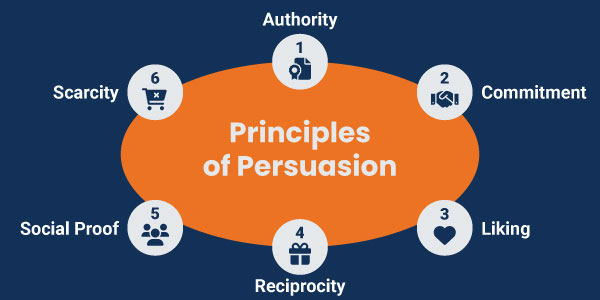How Social Proof Increases Conversions
Executive Summary
- Social proof theory suggests that humans tend to conform to behaviors and decisions based on their perception of others in the same situation.
- Social proof is a big deal as a marketing strategy, as online product reviews, customer feedback, and user-generated content can sway potential customers to buy into your brand.
- The key here is learning how you can leverage social proof by designing websites, online advertising, and social media accounts to reflect your audience's psychological desires to fit in and avoid missing out on a positive experience with your brand.
How Social Proof Increases Conversion Rates
When ordering for the first time at a restaurant, have you ever asked the waiter what was most popular on the menu?
This act of “looking to the crowd” for social proof is so natural for humans to engage in when making choices, which is why it’s such a powerful tool for your business.
Social proof such as customer feedback or reviews encourages your target audience to trust your brand by demonstrating that many others have purchased and reviewed your product or service. At the same time, you establish a sense of transparency and authenticity, since the reviewers are people just like your visitors.
What Is Social Proof and Social Proof Theory?
Psychologist Robert Cialdini coined the term and popularized the concept of "Social Proof" in his famous 1984 book "Influence: The Psychology of Persuasion." Cialdini posits that social proof, also called Informational Social Influence Theory, causes human beings to conform to the behaviors of those around us, especially in socially ambiguous situations.
In other words, people look to others for clues about how to act or what to choose.

Principles of Persuasion
Cialdini categorizes social proof as one of his "6 Principles of Persuasion." These principles describe six methods for convincing others to shift their stance or make a decision.
Modern marketing approaches apply these principles as a form of behavioral design meant to increase conversion from website visitor to online shopper and ultimately to product or service customer:
Authority
People tend to trust the opinions of figures in authority, particularly those bearing particular signs of apparent credibility. For example, consumers trust a celebrity endorsement or the doctor in a lab coat in an advertisement.
Commitment
Humans associate commitment with their self-image, so we're likely to follow through on a public commitment in the name of consistency. People like to be known for keeping their promises.
Liking
People tend to feel more connected to others with whom they share interests or find more visually appealing. In other words, consumers are attracted to brands and products that seem similar to them in appearance, background, or likes.
Reciprocity
The desire to pay back a debt or return a favor is inherent in human relationships, including commerce. Customers feel compelled to reciprocate with a purchase or a positive review if a business offers a discount or other incentive.
Scarcity
Consumers don't want to miss a great opportunity or unique experience, and a scarcity mindset can push them to purchase. Limited edition varieties or short-term sale prices encourage consumers to make decisions quickly to ensure they don’t miss out on the benefits.
Social Proof
In essence, social proof theory suggests that people tend to seek safety in numbers. We're more likely to join the behavior if others are doing something.
When potential customers perceive that a particular business is popular due to social proof, they're more likely to complete a purchase.
Why Is Social Proof Important?
As a method of behavioral design, social proof is a critical component of marketing strategy, both online and in person. Online marketing uses social proof mainly through customer review and feedback tools, social media interaction, and media coverage.
According to Sprout Social, a social media management tool for businesses, a significant majority of consumers interact with other users before, during, and after they decide on a product or service:
- 82% of American consumers request recommendations from friends and family before making a purchase
- 83% of consumers following a particular brand on social media will recommend it to family and friends
- 91% of online shoppers read reviews before deciding to make a purchase
This level of interaction with different elements of social proof quite simply leads to a greater conversion rate and higher sales numbers.
Why Is Social Proof the Most Powerful and Persuasive Behavioral Design Technique Available?
Why do social proof techniques reach more people than any other online marketing strategy? Mostly because they’re consumer-driven. 87% of potential customers research online reviews of local businesses, and 66% are likely to purchase a product with positive reviews.
Notably, over 93% of consumers rely on customer reviews of unfamiliar products or businesses when making purchase decisions. 72% of shoppers consider online reviews as important as recommendations from friends and family.
Human social networks thrive due to the innate desire to “fit in” with the group, and people's individual responses to various social cues underscore the point. The Social Proof Theory explains people's inherent desire for acceptance, despite a wish for others to perceive them as unique individuals.
Recent data suggests that social proof drives many consumer decisions, especially with younger people.
How To Use Social Proof in Digital Marketing
As you build your brand and begin to include social proof in your marketing strategy, you may need to experiment with various iterations to get the right mix.
For example, Gen Z consumers place significant trust in user-generated content, such as reviews and product pictures. To get started, implement some general approaches to social proof placement on your landing pages:
- Support your copy: Place social proof near a call to action or friction point.
- Counter objections: Consider the reasons a potential customer might convert.
- Be specific: Target your messaging to support your brand's story and values.
- Humanize your marketing: Connect your audience with real people and companies through their pictures and social media pages.
Once you have a firm grasp of the big picture of your social proof design, consider the types of content and messaging you want to leverage:
- Current users: Calling attention to positive ratings on review sites or social media accolades
- Wisdom of friends: Seeing friends or family using and making positive comments about your brand online.
- Wisdom of the crowd: Noticing that many people endorse your brand as social media followers or users of your product or service
- Expert or celebrity: Getting a recommendation for your product from an expert in your industry or an endorsement from a celebrity on social media.
- Certification: Validating customer experience with a visible sign of success or authority, such as a "Verified Customer" tag.
What Is the Psychological Basis of Social Proof?
The social proof theory purports that people adapt behaviors and decisions to match others. To put this in more everyday language, human beings like to be liked. This definition is based on how people measure up to their social norms, which are a culture's beliefs about appropriate behavior for a particular circumstance or context:
- Informational conformity: Our desire to be correct
- Normative conformity: Our desire to be accepted and liked
- Informational social influence: When we change our behavior to conform to other people we perceive to have greater knowledge
The last term, informational social influence, is also a brief definition of social proof. When people assume that other people in a situation have more expertise or knowledge, their behavior changes to match those of others.
Similarly, herd behavior describes how individuals within a group will act collectively, even without direct instructions.
Website visitors share certain traits that enhance the efficacy of social proof behavioral design methods. For instance, people's intrinsic uncertainty in unfamiliar situations leads them to seek information through customer feedback or reviews.
Along the same lines, people adopt the attitudes and behaviors of others who have similar characteristics or backgrounds.
User-generated content, such as influencers and affiliates, encourages social proof behaviors because people see and hear those who engage in the development of a brand's image as experts, and, if they relate to them in some way, will be more inclined to engage.
Quantity is vital, too: Social proof methods work best when larger numbers of people support desired actions.
Thus, the internet has incredible power to influence an uncertain audience towards conversion through the multi-source effect generated by ample customer feedback boards and reviews.

How Social Proof Improves Conversion Rates
Customers are bombarded with media and advertising, and fatigue often sets in. Even worse, the deluge is so intense that it can become simply background noise.
However, strategic social proof practices, in the form of user-generated content, can mitigate the potential for your brand's story to become lost in the static.
User-generated content allows your customers to participate in the process of spreading brand awareness in authentic and spontaneous ways. Social media users read and watch as their peers have positive experiences with your product or service, and that social proof influences them to visit your site and move from visitor to buyer.
Similarly, genuine, unpaid reviews (both positive and negative) and customer Q&A sections drive interest and increase your brand's apparent authority and trustworthiness.
Even SaaS companies can dramatically improve conversion rates by capitalizing on social proof. SaaS advertising is different than typical product marketing because you must explain how your product works.
The most potent social proof methods require a combination of authenticity and clarity to reach and influence your audience. These may include:
- Providing product case studies
- Making popular choices the default options on drop-down menus
- Highlighting product reviews on your homepage
- Creating an online buzz on social media
- Garnering expert endorsement and testimonials
How To Generate and Collect Social Proof
It's critical to approach your social proof marketing strategy as a long-term project to increase your eCommerce customer conversion rates and attract a wider audience. Beyond any immediate bump in site traffic and sales, you want a loyal customer base that sticks with you long-term and helps to expand your reach.
Focus your initial efforts with social proof on customer reviews and feedback. This component of your design is the foundation for all of the associated social proof methods. Once you have some user-generated content, the process gains momentum over time.

Customer Reviews and Feedback
- Gather customer testimonials with a clearly placed review section on your website. Alternatively, establish a presence on a review site like Trustpilot or Google My Business.
Institute automated customer contact to newly converted customers with a greeting and an invitation to review their purchases. - Monitor your seller ratings on third-party sites, if applicable. Respond promptly and compassionately to customer concerns, and make it evident that you have remedied the issue fairly.
- Encourage your customers to submit product reviews with specific information about their purchase, including details like size and color so that visitors with similar interests or requirements can search for relevant comments.
- Request photo and video reviews, as these types of reviews come across as more trustworthy and engaging.
- Start a blog to share your brand's story and to encourage your audience to connect to your brand's mission, vision, and values.
Listening Tools
- Post on social media about your company and products, and ask your customers to "be social!" and follow your accounts.
- Use social media accounts and user forums as listening tools. Paying attention to your audience and allowing them to engage with you and other customers increases their trust in your brand and sense of belonging.
- Develop a robust Q&A section on your site to clarify your brand's vision and dispel any doubts potential customers may have about your product's value or purpose.
Critical Statistics
Share your site's statistics to build credibility and capitalize on the influence of the "wisdom of the crowd." Include the statistics for:
- How many purchased from this site
- How many recently viewed this site
- How many recently reviewed this site
- How many purchased this product
- How many recently viewed this product
- How many recently reviewed this product
This may seem a bit overwhelming, but there are great tools to help you accomplish all of this in a short period of time. When you're ready to build your brand's online reputation and connect with customers in new and tangible ways, Shopper Approved will dive into the behavior design game with you.
We have robust tools that you can use to capitalize on the effects of social proof to increase your traffic and conversion rates, including software for managing seller ratings, product reviews, reputation management, video and local reviews, and Q&A pages.
Our mission is to help consumers make better buying decisions by building their trust in our clients' brands, so contact us to get started.
Other Social Proof Articles

 Drive More Visibility, Traffic, and Sales
Drive More Visibility, Traffic, and Sales
